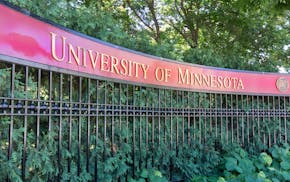Bertrand Weber still remembers his reaction years ago when he toured the assembly line producing meals in plastic containers for Minneapolis schools: "Why are we sending TV dinners out to kids?"
At the time, Weber was being hailed among the state's school lunch directors the changes he'd made in the Hopkins district, introducing fresh, nutritious ingredients that gave students a choice. Now after six years supplying districts in the private sector, Weber has taken over as the Minneapolis district's nutrition director, overseeing the Plymouth Avenue food facility and bringing big plans to transform what city kids eat.
Students will get wider choices and fresher ingredients, more of them from regional farmers. They'll get more real vegetables -- squash and sweet potatoes, spinach and broccoli -- instead of constant French fries. The district is looking for land for an urban farm that will educate students about what they eat.
But the proof is in the eating, and judging by student reaction at Washburn High School, where Weber and his staff are testing menus they'll be adding next year, they've hit the mark.
"I feel like I'm in Subway," senior Robert Blue enthused after picking up his make-your-own ciabatta sandwich, with his choice of bread, cheese, meat and toppings. He said he'd talked to the lunch ladies just a week before Weber's weekly tests started a month ago about getting healthier, maybe even organic, food. "I'm in school and I'm eating healthy food," he marveled.
He had company. Washburn students have put the label "Real Food Day" on Thursdays when recipes are tested, like the recent burrito bar that let them select from such toppings as pico de gallo or roasted corn salsa. Students are voting with their forks, too, with the number of kids leaving the open campus for lunch elsewhere down sharply on Thursdays.
Principal Carol Markham-Cousins said her students are responding to the "respect": "You get food that tastes good. People give you options. You act much better."
School lunches long were the dominated by surplus federal commodities. But that landscape has changed, thanks to people like Weber.
The Swiss-born Weber has 37 years' experience in food, lodging and club management, including six years as manager of the Whitney Hotel. At Hopkins earlier this decade, Weber pushed to get rid of trans fats in student food when substitutes were hard to find; now it's a federal mandate. More schools seek milk without bovine growth hormone and products without high-fructose corn syrup. New federal mandates emphasizing healthier foods will crowd starches aside in menus.
Indeed, Weber opened a briefing for the Minneapolis school board recently with grim stats on rising childhood obesity and Type 2 diabetes juxtaposed with data showing key nutrients in their diets falling after children enter school.
That's why it's critical to teach nutrition and provide healthy choices, Weber said. So Washburn students supplemented their ciabatta and hero sandwiches with a choice among three test salads: a chickpea-laden Mediterranean salad, a cabbage-dominated Asian slaw and a wheatberry-lime concoction. The slaw got the most takers.
Next school year, all district high schools will eat the fruits of these tests, getting six categories of entrees and a salad bar daily. Two elementary schools with kitchens, Folwell and Jordan Park, will do more prep work and cooking on-site with bulk food supplied from Plymouth. Most other district schools will get a salad bar by spring break of 2013. Meanwhile, Weber will launch a feasibility study of whether to add kitchens to middle and elementary schools that currently depend on pre-packaged meals.
He also aims to buy 40 percent of district food locally in two years, and the district is sponsoring its first farmer fair on May 7 to discuss plans to buy fruit, vegetables, grains and ground beef next year.
For years, Weber said, school lunch officials felt they'd done their job if their meals met U.S. Department of Agriculture standards and made money. In Minneapolis, officials said that the district's heavy enrollment of free or reduced-price lunch students and reliance on state and federal subsidies made Hopkins-style meals impractical. Weber disagrees. With federal aid of $2.77 for each free lunch, he's proposing that the district raise its price for other students from $2.10 to the $2.50 that Hopkins was charging in 2005 for high schoolers, and from $1.85 to $2 for younger students.
Despite the higher prices, Weber aims to boost the number of students eating school lunch, now about two-thirds of elementary students and just over half of high school students, to 75 percent. He hopes to get two-thirds of students eating school breakfasts, and get all of them doing so in the classroom, rather than a cafeteria, due to better attendance.
"He's the perfect person for the job," said Megan O'Hara, an activist in the Minneapolis homegrown food movement who urged Weber to apply.
But what ultimately matters is pleasing the customers, and on that score Weber's crew seems to be succeeding. "It's 10 times better than last year," said Washburn senior Radmen Niven. But there's one thing wrong -- he's graduating before next year's menu changes. "I'm really, like, disappointed."
Steve Brandt • 612-673-4438

Teen suspect in Nudieland mass shooting arrested on murder, assault charges
'Human error' behind Robbinsdale shelter-in-place alert that was mistakenly sent countywide

Going to Wolves or Twins tonight? How to get there (and maybe avoid traffic).
Focusing on bringing football film into frame
